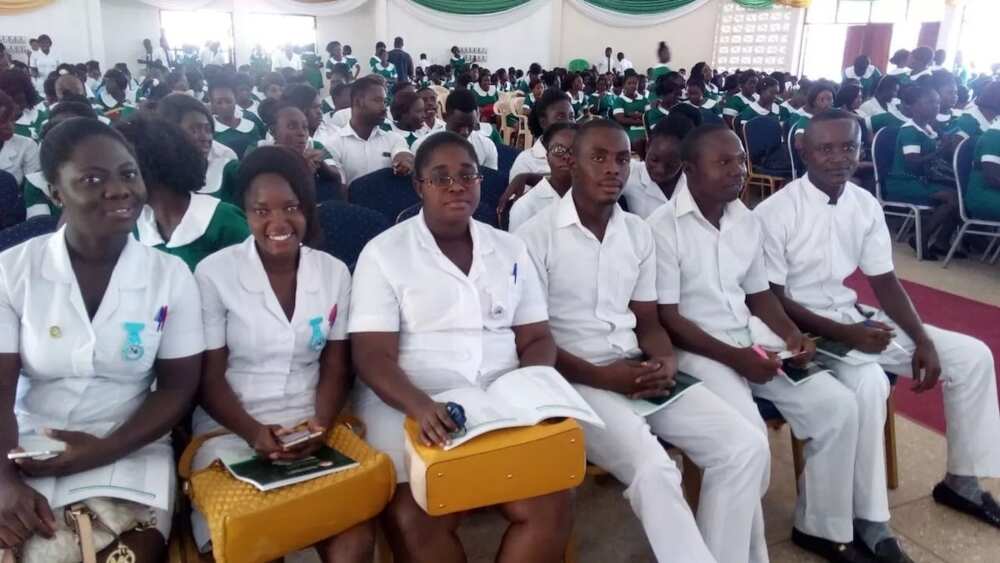
The Ghana Registered Nurses and Midwives Association (GRNMA) has intensified its nationwide strike, plunging healthcare delivery into a state of emergency and drawing growing concern from the public and policymakers alike. The strike, which began in early June 2025, has been triggered by government delays in implementing revised conditions of service negotiated and agreed upon in 2024.
Hospitals and clinics across the country—both public and some private—have reported long queues, overwhelmed emergency departments, and severe staff shortages. Thousands of patients remain stranded, especially in rural and regional health facilities.
In response, the Ministry of Health has released a list of alternative health facilities that remain functional, urging the public to seek care in these designated centers. The government emphasized its commitment to minimizing the strike’s impact while efforts to resolve the impasse continue.
On June 9, the Ashanti regional branch of GRNMA withdrew all services on—outpatient, inpatient, emergency, and antenatal—despite a court injunction. The Association stated it had not been formally served with the injunction and viewed the strike as lawful.
In the Greater Accra Region, GRNMA’s regional chairman, Jefferson Asare, said the Association remained open to dialogue but would not renegotiate already agreed terms from the 2024 Collective Agreement.
On June 10,Health Minister Kwabena Mintah Akandoh held a press briefing urging retired nurses and midwives to temporarily return to service. He cited the “urgency of the situation and the suffering of patients” as justification for the call.
The Ministry announced that the Ministry of Finance and the Fair Wages and Salaries Commission had been directed to urgently create a roadmap for implementing the new service conditions.
GRNMA, however, firmly rejected the idea of retirees substituting active members, stating it undermined the real issues and failed to provide a sustainable solution.
Wednesday, June 11,GRNMA President Perpetual Ofori-Ampofo publicly declared that the Association had “run out of patience.” She criticized government delays and expressed frustration over the lack of action since the new administration assumed office in January.
“PHARMACY’S BETRAYAL: A STOLEN TRUST”
The Association also dismissed the government’s claim—made by Deputy Finance Minister—that implementing the new agreement would cost an additional GH¢2 billion. GRNMA leaders described the figure as exaggerated and indicative of poor prioritization.
Health Minister Akandoh reiterated that the government values the work of nurses and remains open to meaningful dialogue. He added that his office is “working around the clock” to bring about a peaceful resolution.
Member of Parliament Felix Kwakye Ofosu confirmed that efforts were being made “quietly behind the scenes” to address the crisis without worsening the situation.
Core Issues at Stake
Delayed Implementation: The primary trigger of the strike was the government’s proposal to postpone the implementation of the 2024 Collective Agreement to 2026, which GRNMA has outrightly rejected.
Budget Concerns: Government officials claim the full implementation would strain the national budget. GRNMA argues this is an excuse, not a justification.
Emergency Measures: The call for retired nurses to step in has been roundly dismissed by the Association.
Public Health Impact: Essential health services—especially in maternity, emergency care, and chronic disease management—are being severely affected.
SOLUTION TO PREMATURE EJACULATION IN MEN
What the Public Should Know
Seek Alternative Facilities: The Ministry of Health has published a list of available facilities where patients can still receive nursing services. Sch as; Korle‑Bu Teaching Hospital, Accra
37 Military Hospital, Accra
Tamale Teaching Hospital, Tamale
St. Dominic Catholic Hospital, Akwatia (Eastern Region
Faith‑Based & CHAG Facilities
Across all 16 regions, (CHAG) hospitals and clinics remain operational etc
Dialogue is Ongoing: While tensions remain high, both parties have expressed a willingness to continue discussions.
No End in Sight (Yet): Despite emergency meetings and public appeals, a definitive resolution has not been reached, and the strike continues unabated.
MOH ACTIVATES EMERGENCY MEASURES AHEAD OF NATIONWIDE HEALTH STRIKE – GHANA
Patientlifematters.com: As the strike by Ghana’s nurses and midwives enters its most critical phase, the nation watches closely. With lives at stake and healthcare systems overwhelmed, the need for decisive, fair, and urgent action has never been more pressing. The government and GRNMA must find common ground—not only to end the strike but to rebuild trust in Ghana’s healthcare system.
The government should address this situation before it gets out of hands, causing deaths.